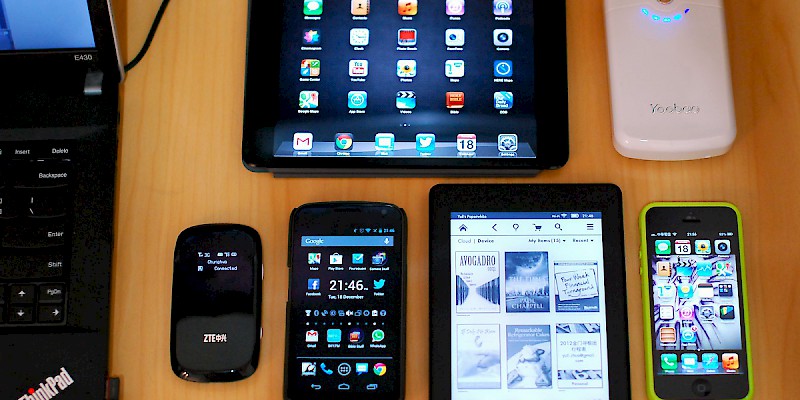Traveling with(out) electronics

In a perfect world, you'd travel without any electronics, but...
In today's world, you probably have to carry (charge the batteries on) your phone, digital camera, tablet, laptop...
Currents, voltage, and the traveler
American current runs 110V, 60 cycles. Europe runs 210 to 220V and 50 cycles.
Technically, you can't plug an (old fashioned) standard American appliance into a foreign outlet without frying your appliance and/or blowing a fuse. You need a currency converter or transformer to bring the voltage down and the cycles up.
Luckily, nearly all modern devices designed to travel have the converter built in: smartphones, iPads, laptops, digital cameras, hairdryers, etc. Check the bottom panel, the script embossed in the plastic of the charger plug, or the instruction manual to be sure.
Plugs: Flat pegs, meet square holes
Even if your device has a converter built in, you still can't plug an American appliance into a foreign wall because it just plumb won't fit.
American plug prongs are flat and parallel, sometimes with a third, rounded grounding pin. The U.K. uses large, funky plugs made from three huge, flattened fingers of metal arranged in a triangle and set at different angles. (Most of the rest of Europe uses two round pins.)
You can get small plug adaptors that make the switch—I carry several so I can plug in multiple things at once—but these are not currency converters. For older devices, you still need to go through a transformer to get the electrical current running properly.
What electronics to bring
As few as possible, really.
The only pieces of electronic equipment I travel with that isn't battery-powered are my phone, camera, and trusty laptop—and I only need that last one because I have this strange job of writing about my travels.
Electronics of any kind are just a big hassle on the road. They take up excess room in your luggage, take time out of your schedule, and often put hotel fuses out of commission.
This hassle is five times worse with anything that has a cord.
Like it says on the Ultimate Packing List, take a small battery-operated alarm clock, and one of those teensy flashlights for poking around ancient ruins and finding stuff in the dark.
Beyond that, try to travel without electronics.
-
Phone. If you have a smartphone, bring it. It might or might not work abroad (read all about that here), but since it is stuffed with other useful electronic tools (camera, voice recorder, compass, alarm, etc.), it can come in handy on the road. » more
-
Tablet. If you are a tablet user, bring it along—but remember: anything you lose or break is on you. I actually travel with a small, cheap, Google-branded tablet, primarily because my cellphone is on AT&T, but I can stick in a T-Mobile sim card in the tablet and pay just $20 a month for high-speed data in 150+ countries and then use the tablet for maps, searches, Skype, Yelp, and other handy travel needs. » more
-
Camera. Since few digital cameras take regular old batteries anymore, only the rechargeable kind, go ahead, pack that charger (and bring a spare battery; you'll use the juice up quickly snapping pics all day). Then again, if your phone has a decent camera on it, you might just stick to that. If makes fewer things to carry around, to worry about losing, and to charge every night.
-
Hair dryer. A hair dryer, even the teensy portable kind, is just another monkey on your back. Air dry, baby. Or, if you insist on fluffy locks, know that the majority of European hotels from the moderate range up have built-in hair dryers in the bathrooms. If you insist on lugging your own hot air over there, heed my plea and make sure that either it is a travel, dual-voltage hair dryer or that you carry along a converter. Hotels black out on a regular basis when an American plugs in his 110V hairdryer and the appliance either explodes in an impressive shower of sparks or melts in his hands. This stunt has long since ceased to amuse hoteliers and other guests.
-
Shavers. For shaving, I'd stick with Bic
or disposable-head razors
unless you have a battery-operated electric shaver—that way you won't have to bother with voltage problems. If not, however, most hotels have a special plug for low-wattage shavers and shavers only. Such outlets are usually identified by an icon of a half-shaven face. If you plug anything other than a shaver in there, you'll join the unpopular hair dryer-melting, fuse-blowing crowd.
-
Other electronics. If you're planning to bring along any electronic device other than those mentioned above, ask yourself whether you really need it. (Hint : the answer is "no.")
Please turn off all electronic devices as we begin our descent into...
Airlines will request that you don't have your computer, tablet, phone, or any other electronic device turned on during take-off and landing—or at least put the thing into "Airplane" mode (this turns off all antennae and stops it from sending, receiving, or searching for external signals.)
On the off-chance that the waves emitted by these items might foul up the computerized guidance systems, they're hedging their bets against the GPS signal from your iPhone causing the plane to crash.
On the off-chance that they're right, I for one am wholly on their side.
- REI.com - Since 1938, one of the best all-around outdoors, camping, and adventure travel outfitter, with just about everything you need, whether you're a novice or a hard-core enthusiast. Lots of high-tech clothing designed for heavy-duty wear, tear, travel, and sport, plus everything from packs to personal mosquito nets to biodegradable detergent—and of course, all the basic gear for camping, hiking, mountaineering, mountain biking, skiing, canoeing and kayaking. It's actually run as a co-op, so if you become a member ($15 to join for life), you get 8% cash back on your purchases at the store at the end of the year (10% back if you use the no-fee, free credit card they give you, which also generates 1% back on non-REI purchases). They also have a special clearance-sale section.Partner
- Travelsmith.com - One of the best catalogues out there for travelers (not so much outdoorsy stuff), with high-quality clothing and luggage (and some gadgets) carefully selected or adapted to be perfect for traveling—durable, versatile, wrinkle-resistant, lots of hidden pockets, and sometimes even stylish. My wardrobe's full of stuff with their label on it—though in recent years, they seem to have become increasingly concerned with offering more and more fashion clothing than their old focus on true travel gear. Sad. Also, I should note that some women (my mom and my wife, to be precise) report that the women's clothing is a bit more hit-or-miss—usually excellent, but sometime a big let-down in terms of quality or looks.
- eBags.com - The name really says it all, doesn't it? This is the single best online outlet to compare every concievable type of bag, suitcase, pack, purse, backpack, shoulder bag, duffel, and every other conceivable form of carrying-your-stuff travel container out there—along with related accessories. Good prices, too.Partner
- LLBean.com - This Maine camping clothier and catalogue legend was selling flannel shirts long before Seattle produced its first garage band, and decades before J. Crew and Banana Republic co-opted the outdoorsy look and made it Yuppie. Their travel specialty gear is, as with most of their stock, head and shoulders above anyone else for durability, quality, and utility (if not always style). Best of all: "We guarantee all items for the useful life of the product." That statement is what has hooked people on this storied outfitter since it sold its first pair of boots in 1912. (Its original bricks-and-mortar store in Freeport, Maine became such a site of pilgrimage for vacationing fans of its catalog that it single handedly created the town's now world-famous outlet store industry.)
- Magellans.com - Clothing, luggage, and lots of travel gadgets—some exceedingly useful, others merely ridiculous exercises in technology (seriously, who needs a portable oxygen mask, or a silver case that automatically dispenses credit cards?). Their prices could be lower, but they do carry some prime merchandise difficult to find elsewhere and Magellan's really is the place to go when you're seeking some obscure but useful travel gadget (and I don't mean the collapsible Lexan wine glasses).
- Amazon.com - An obvious one, but a good resource to remember. Everybody's favorite one-stop shopping site on the Internet carries just about anything you could think of.Partner

 Alice Liddell, Age 7
Alice Liddell, Age 7 Alice Liddell, age 20
Alice Liddell, age 20 Alice Pleasance Liddell Hargreaves, age 80
Alice Pleasance Liddell Hargreaves, age 80




